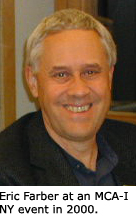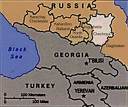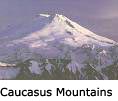July 14, 2006
By Eric Farber
A former producer and past president of MCA-I NY, ex-pat Eric Farber writes from the Republic of Georgia. He and his wife, Kay, now live in Istanbul, Turkey.
 A recurring memory from a recent trip that Kay and I took to the Republic of Georgia is of a large pig running freely alongside our bus as it slowly edged around the large, linked potholes that make up many of Georgia’s secondary roads. A free-range pig, unpenned and unsupervised, is not something I believe I’ve ever seen before, yet it wasn’t the most unusual sight we experienced during our four days in this seldom-visited country.
A recurring memory from a recent trip that Kay and I took to the Republic of Georgia is of a large pig running freely alongside our bus as it slowly edged around the large, linked potholes that make up many of Georgia’s secondary roads. A free-range pig, unpenned and unsupervised, is not something I believe I’ve ever seen before, yet it wasn’t the most unusual sight we experienced during our four days in this seldom-visited country.
Although it’s been a long time since I’ve written to you, I can summarize the past few months pretty quickly. This year the Istanbul winter seemed to go on forever, not terribly cold but with lots of intermittent rain, the kind of rain that I imagine brings on malaise among the inhabitants of towns like Seattle. Perhaps the effects of the weather were magnified this year by our winter activities, which consisted mostly of work. In addition to a heavier teaching load, I’ve been studying Turkish with intensity for several months. I’ve come to the conclusion that the only way for an average native English speaker to learn this language is to study it intensely. Even then, a learner must endure a long period of delayed gratification. My own struggles increase my empathy with the frustrations of my students as they labor to learn English. It’s a weird feeling to whipsaw daily between English classes, where I am in such command, to Turkish classes where I still feel like a baby.
Kay’s been working hard, too. Though she’s taught less than I have, she’s had a number of corporate-benefits related writing assignments, and since I’ve been more preoccupied with teaching and learning, she’s taken on more of the shopping and cooking. The net effect of all this is that we’ve been staying close to home lately, albeit with a couple of welcome visits from U.S. friends Mike and Judy Stoner and Jennifer and Wyatt Rushton. Apart from our trip to Georgia and a weekend in the Turkish city of Eskisehir to attend the wedding of one of our teaching colleagues, where I went with friends but without Kay, neither of us has left the Istanbul area since our trip to London in January. However, this is about to change.
and a weekend in the Turkish city of Eskisehir to attend the wedding of one of our teaching colleagues, where I went with friends but without Kay, neither of us has left the Istanbul area since our trip to London in January. However, this is about to change.
I finish teaching at the end of this month, and our short list of places to visit in the coming weeks and months includes Bulgaria, Romania, Finland, the Baltic Republics and the cities of Ankara and St. Petersburg. We’ll also be coming to the States, and the timing of that trip depends on the sale of our New York apartment and the departure of our current tenants. We predict this will be in late August or early September. Now, back to Georgia.
This trip happened the way it did for us because a year ago we joined an organization named Friends of the American Research Institute in Turkey. One of FARIT’s missions is to organize guided cultural tours, both within Turkey and to neighboring countries. Although Kay and I don’t as a rule travel with tours, we joined this one because of its cultural aspect and because Georgia was a mysterious country we knew almost nothing about and might have been reluctant to visit on our own.
Our second concern turned out to have been justified. At this time, Georgia has the weakest tourist infrastructure of any country we’ve ever visited. Speakers of languages other than Georgian and Russian are scarce, and signs are mostly written in the Georgian alphabet, which, though beautiful, resembles no other writing on the planet. Until the collapse of the Soviet Union, Georgians had not seen independence for a long time, if ever. Their homeland belonged to the Russian Empire for more than 100 years before being incorporated into the U.S.S.R. For ages before that, it had belonged to the Persian and Ottoman Empires. What seems remarkable, to us anyway, is that throughout all the wars, invasions, dominations and partitions, the people of Georgia have managed to maintain their individual identity and traditions. The mountains helped of course.
 Georgia’s principal geographic feature is the Caucasus Mountains, which run roughly east and west through the northern half of the country. As we saw on an aborted day’s excursion from the capitol city of Tbilisi to the town of Kazbegi in the heart of the Caucasus, these mountains are formidable indeed. Mountain people throughout the world have traditionally been able to resist invasion and domination better than lowlanders, and the mountain tribes of Georgia are no exception.
Georgia’s principal geographic feature is the Caucasus Mountains, which run roughly east and west through the northern half of the country. As we saw on an aborted day’s excursion from the capitol city of Tbilisi to the town of Kazbegi in the heart of the Caucasus, these mountains are formidable indeed. Mountain people throughout the world have traditionally been able to resist invasion and domination better than lowlanders, and the mountain tribes of Georgia are no exception.
Georgia is an ancient land, its beginnings more the stuff of legend than history. One account has Georgia’s Black Sea province as Colchis from where Jason and the Argonauts obtained the Golden Fleece.
Although a small number of Georgia’s five and a half million people are Muslims, Georgia’s population is overwhelmingly Orthodox Christian. The story is that a woman, St. Nino, brought Christianity to Georgia from Cappadocia in the 4th century. Everywhere we went in the country there were churches, all, except for the most ancient, still in use. And what was, to our eyes, most unusual, was that there seemed to be services happening in most of them. No matter the time of day, nor the day of the week, there was much incense and spiritual devotion, people making the sign of the cross as they venerated the many icons. Many of the devoted were young people, not something we’re used to seeing in churches in the West.
Georgia is a very poor country alongside of which Turkey seems almost wealthy. Surprisingly for us, in Tbilisi the only brand-new building we saw was a large cathedral, obviously very costly and paid for we don’t know how, but busy with  activity even on a weekday afternoon. Such is the power of religion in the lives of the Georgians.
activity even on a weekday afternoon. Such is the power of religion in the lives of the Georgians.
Of all the aspects of our Georgian adventure, not the least interesting was the makeup of the group itself. There were seventeen of us led by Ernie Tucker, a history professor from the U.S. Naval Academy at Annapolis. Ernie is a specialist in Persian and Ottoman history with an encyclopedic knowledge of Asia Minor and the entire Mid-East and Central Asian regions, including several of their languages. When it came to languages, almost everyone on the bus spoke at least two, and some spoke many more. We were also an extraordinarily well-traveled bunch; collectively, it seemed we had been everywhere.
Our transport was by bus, and to be frank, there were moments on that bus when I almost envied the sheep and goats that frequently blocked our way; they seemed to be moving faster then we were. Georgian roads, apart from a couple of arterials, are in pathetically poor condition, and although we had a cautious, skillful driver, we often had to move at a snail’s pace. A drive of 50 kilometers became a long journey. Paradoxically, it took so long getting to places of interest that our visits once we arrived often seemed rushed for lack of time. Because the Georgian countryside is almost as devoid of amenities as the moon, promised lunches turned out to be mirages. Toilets and restaurants were veritable oases, and meals, when they came, were causes for jubilation.
In spite of this, we ate very well in Georgia. The pork, seasoned, marinated and cooked shish kebab style, was as good as we’ve ever eaten anywhere, and after months in porkless Turkey, it was quite welcome. Another favorite was khinkali, a spicy meat dumpling that oddly enough was served at the end of a big meal when we thought we couldn’t eat another thing. Lobio, which unfortunately I only tasted once, is a delicious baked bean dish cooked in a crock. A Georgian staple, eaten either as a snack or a meal, is khachapuri, bread or puff pastry stuffed with cheese and baked in a hot oven. We also enjoyed the Georgian wines, both the vin du pays served family-style in big water pitchers and the vintages that we could order by the glass or bottle. Finally, here’s a curious food note: The country of Georgia and the U.S. state of Georgia have something in common: grits. The variety we were served in Georgia tasted exactly like what we’d get in Dixieland.
 A highlight of our visit came on the last day when, forsaking the final bus tour, Kay and I wandered along Tbilisi’s Rustaveli Avenue and its adjacent parks together with Michelle Cameron, another of our number who is with the Canadian Foreign Service in Ankara. Together, we explored an extensive, open-air art market. For all it may lack in terms of development, Georgia has some fine painters and sculptors. Georgia excels at performing arts, too. That same Sunday in a magnificent old theater, Kay and I enjoyed watching the ballet of Romeo and Juliet while listening to Prokofiev’s wonderful score performed by the ballet’s orchestra. It was a grand performance featuring at least forty dancers, great ensemble numbers, sword fights, and several costume changes. Georgia, poor as it may be in some ways, seems to have inherited the Russian love and mastery of classical ballet. The audience was filled with young people, including a charming 15-year-old-girl, who shared our box with her aunt. During the intermissions, we enjoyed conversation with her; she spoke English well and proudly told us that the next day at school she would tell her classmates about her new American friends.
A highlight of our visit came on the last day when, forsaking the final bus tour, Kay and I wandered along Tbilisi’s Rustaveli Avenue and its adjacent parks together with Michelle Cameron, another of our number who is with the Canadian Foreign Service in Ankara. Together, we explored an extensive, open-air art market. For all it may lack in terms of development, Georgia has some fine painters and sculptors. Georgia excels at performing arts, too. That same Sunday in a magnificent old theater, Kay and I enjoyed watching the ballet of Romeo and Juliet while listening to Prokofiev’s wonderful score performed by the ballet’s orchestra. It was a grand performance featuring at least forty dancers, great ensemble numbers, sword fights, and several costume changes. Georgia, poor as it may be in some ways, seems to have inherited the Russian love and mastery of classical ballet. The audience was filled with young people, including a charming 15-year-old-girl, who shared our box with her aunt. During the intermissions, we enjoyed conversation with her; she spoke English well and proudly told us that the next day at school she would tell her classmates about her new American friends.
On another occasion, we were fortunate to hear some traditional Georgian music performed live. It was the singing that moved us the most, even though we couldn’t understand the words. Mostly, the voices had a spiritual quality and the high, lonesome sound of the mountains.
We hope to go back to Georgia some time. Though what we saw in our short trip was excellent, there’s so much more that intrigues us. Anyway, that will be another adventure. Love and best wishes to all, and remember, we always enjoy hearing from you.




Recent Comments